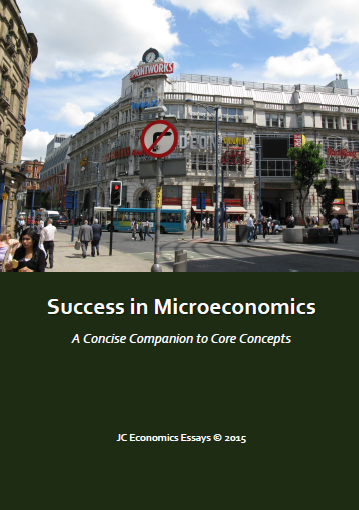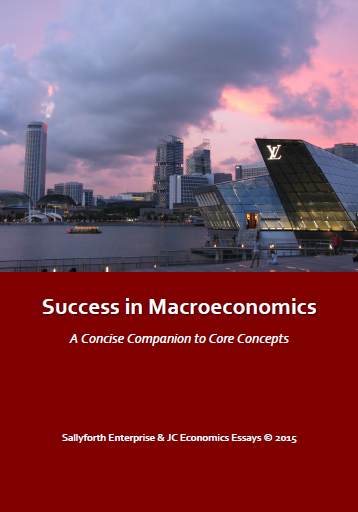How to Write Economics Essays - A Complete Self Help Guide!
Introduction to this Quick yet Complete Self Help Guide
In this post, I will discuss a bit on how to write Economics essays in general.
I simply just had to write this article, because, once again, I was approached by Economics students asking how they could have done better for their Economics examinations. This is a very common issue, and it is a fair and understandable question.
I think some good, simple, clear advice would be able to help students see the process and think through how they could improve on their writing skills, as well as the examination process.
I think some good, simple, clear advice would be able to help students see the process and think through how they could improve on their writing skills, as well as the examination process.
Self-help resources: how to write a good macroeconomics paper, and how to write a good economics paragraph
Before I give a general outline of the essay writing programme that I am about to offer, or proffer - on how to write, craft, create, and produce good Economics essays (whether under examination conditions or under optimal term-paper-like conditions depends on your individual and differing situation) - here are some self help resources to allow you learn how to craft an excellent Economics essay.
This post here on my site would be really useful for writing an essay on macroeconomics:
This post here on my site would be really useful for crafting a good Economics paragraph:
I think both posts provide an excellent starting point into writing a good Economics essay if students are able to apply the concepts that they have learnt.
OK, let's delve into this topic in a few simple steps - here are some simple, concrete steps that anybody can take to write a good Economics essay.
Simple concrete steps to write a good economics essay:
Here goes:
First, you have to know the allocation of the marks.
Under the H1/H2 kind of A level Economics examination, the mark allocations could be 10 marks for part (a) and 15 marks for part (b), or just 25 marks for one essay. For Paper 3 for the GCSE it would be 10 marks, and so on. What about GCE, AS level, A level, O level, and H3 levels? Know the allocation of the marks.
The idea of differing mark allocations for different examinations would also apply for the various versions of the A levels around the world, and so on.
The idea of differing mark allocations for different examinations would also apply for the various versions of the A levels around the world, and so on.
The higher the marks, the longer the essay must be - along with the quality!
Second, you will have to plan before you write your Economics essay.
As the famous saying goes, those who fail to plan, plan to fail. Or something like that. It's quite true.
When planning, focus on an approach. How would you approach this Economics essay, and why? What are the keywords that you must focus on? What is the command, or instruction, word that tells you what you have to do to score the marks in the essay? Circle the command phrase or word, and highlight or underline the keywords or main words.
Be sure to know what you are doing.
Be sure to know what you are doing.
Third, you will need to define the key terms and the main terms in your Economics paper.
Believe it or not, definitions are good starting points and can lead on to assumptions being explicated, and other good Economics materials. You will need to define key terms clearly and accurately.
Fourth, explanations should flow from the definitions and the starting concepts.
Beyond defining, you will have to explain economic theories.
Students can explain Economics ideas and arguments in basically three main ways - mathematically, verbally (written), and through the use of Economics diagrams. For the A levels, at least, mathematics is the least of your concerns in writing the essays, so it basically means that you need to be able to explain well in words, and draw well-labelled diagrams that can show what you want to convey to the examiner or your tutor.
Students can explain Economics ideas and arguments in basically three main ways - mathematically, verbally (written), and through the use of Economics diagrams. For the A levels, at least, mathematics is the least of your concerns in writing the essays, so it basically means that you need to be able to explain well in words, and draw well-labelled diagrams that can show what you want to convey to the examiner or your tutor.
For university students and undergraduates, on the other hand, mathematics is indeed one of the ways you need to use to explain Economics.
(Well, actually mathematics definitely applies to postgraduate Economics as well!)
(Well, actually mathematics definitely applies to postgraduate Economics as well!)
Fifth, you need to provide contextual evidence, which means that you need to know real world case studies, and definitely real world economies.
This also means that Economics students with good general knowledge have a distinct advantage.
Better still, if students have good general knowledge on countries and the economy in which they live in, and main ideas about globalisation and international trade. Be sure you at least know some concrete case studies about the economies in which you live.
Sixth, you try to make arguments that link to the question.
This is a simple point but many students do not do this. The weak students define. The better students define and explain. The strong students define, explain, and link theories to evidence.
The best students do all that - and they make strong arguments for both sides of the case. They address economics questions with balanced arguments, for and against.
Last, but not the least, a good evaluative, judgmental, and nuanced conclusion is needed.
Have you talked about the extent of the Economics problem or issue, and weighed the pros and cons of an issue, or shown both sides of a story? Why is your main argument justified, whereas the other arguments you brought up held no water, in the final analysis?
I often told my economics students that a good evaluative paragraph would do three thing - and three things only.
First, it would signpost; second, it would make an opinion(s) that answered the economics question; and third, it would justify that opinion(s). One day, perhaps when I get round to it, I shall write a whole post on how to properly make an economics evaluation, but that is a task for another time.
To summarise: Signpost by signalling that you are concluding. "In conclusion" or "To conclude my paper" or "In the final analysis" are good examples of a clear signpost that suggests that you are about to conclude your paper. Follow this up by giving a strong opinion on the question (to what extent/ what is the stronger or better argument/ which main argument or stand or side do you support), and then justifying your "extent", "weightage", and "main argument".
When you have given a strong opinion that justifies your body of arguments and wraps up your paper, you have made an evaluative conclusion.
I often told my economics students that a good evaluative paragraph would do three thing - and three things only.
First, it would signpost; second, it would make an opinion(s) that answered the economics question; and third, it would justify that opinion(s). One day, perhaps when I get round to it, I shall write a whole post on how to properly make an economics evaluation, but that is a task for another time.
To summarise: Signpost by signalling that you are concluding. "In conclusion" or "To conclude my paper" or "In the final analysis" are good examples of a clear signpost that suggests that you are about to conclude your paper. Follow this up by giving a strong opinion on the question (to what extent/ what is the stronger or better argument/ which main argument or stand or side do you support), and then justifying your "extent", "weightage", and "main argument".
When you have given a strong opinion that justifies your body of arguments and wraps up your paper, you have made an evaluative conclusion.
Do apply the above bold points that you have learnt, to help yourself craft a good Economics essay.
Think, reason, and apply your Economics.
Thanks for reading, and cheers!
JC Economics Essays: Economics Editor's comments on how to write economics essays.
Update: This essay was updated and further formatted in 2015. Thank you for reading, and cheers.
Update: This essay was updated and further formatted in 2015. Thank you for reading, and cheers.



